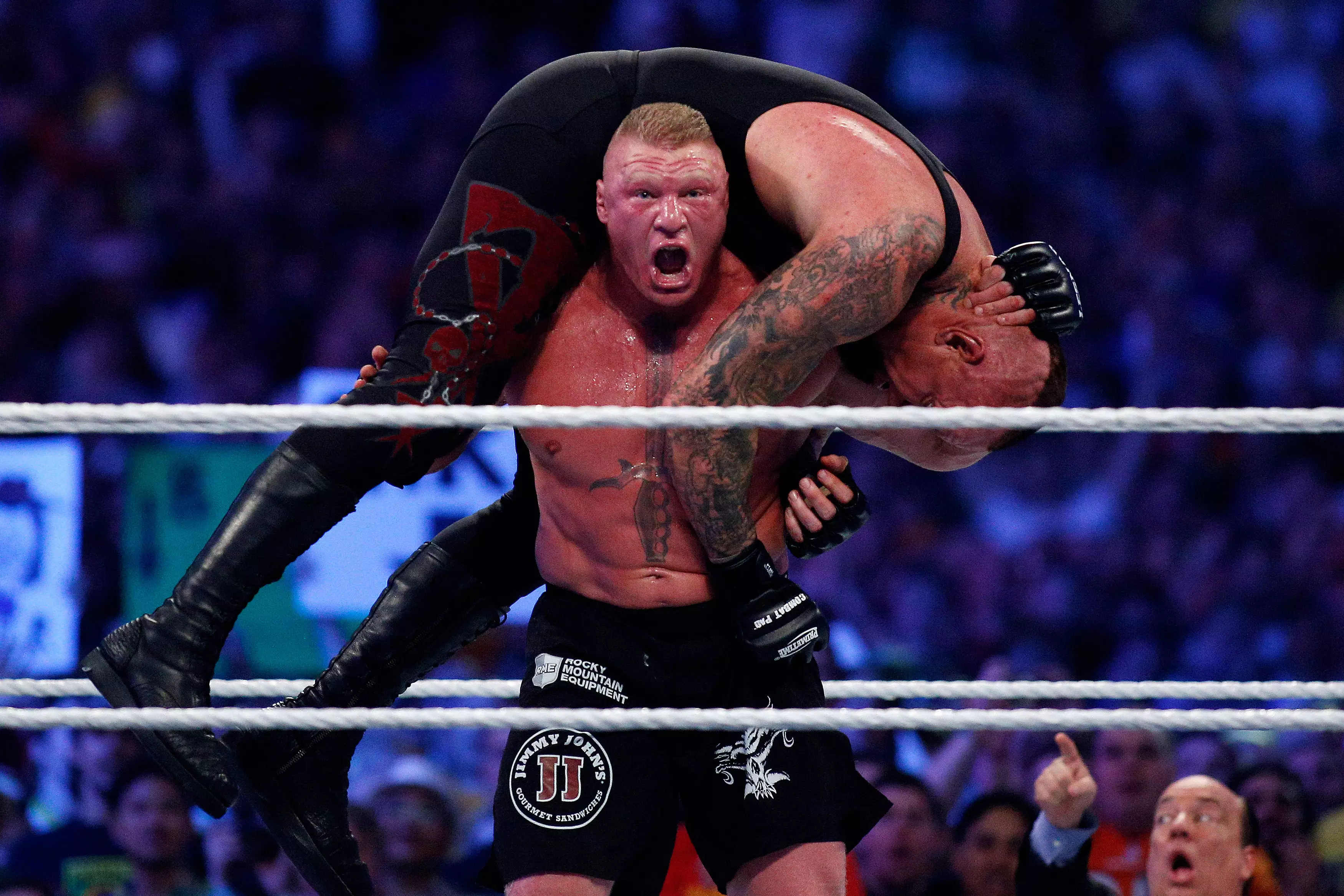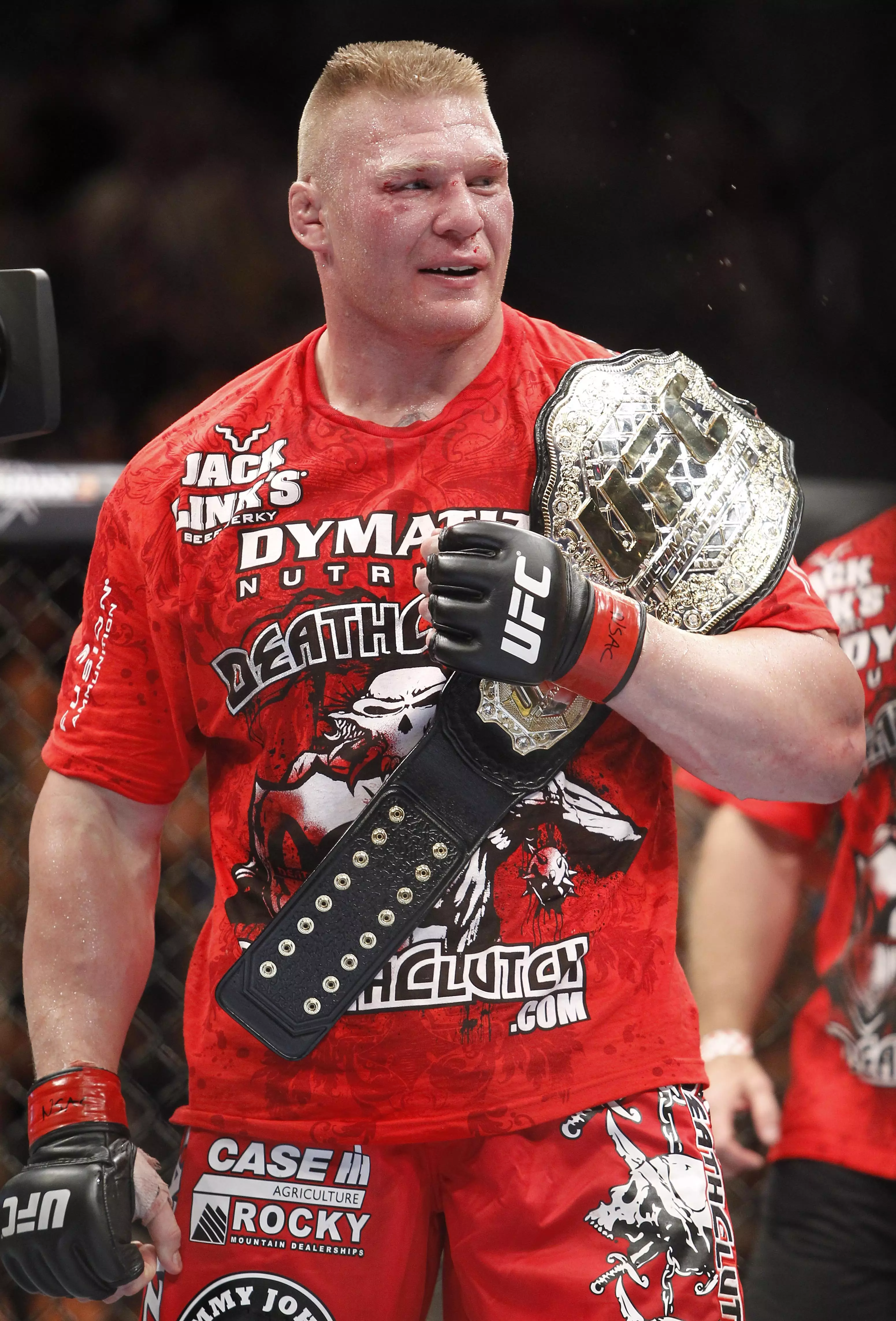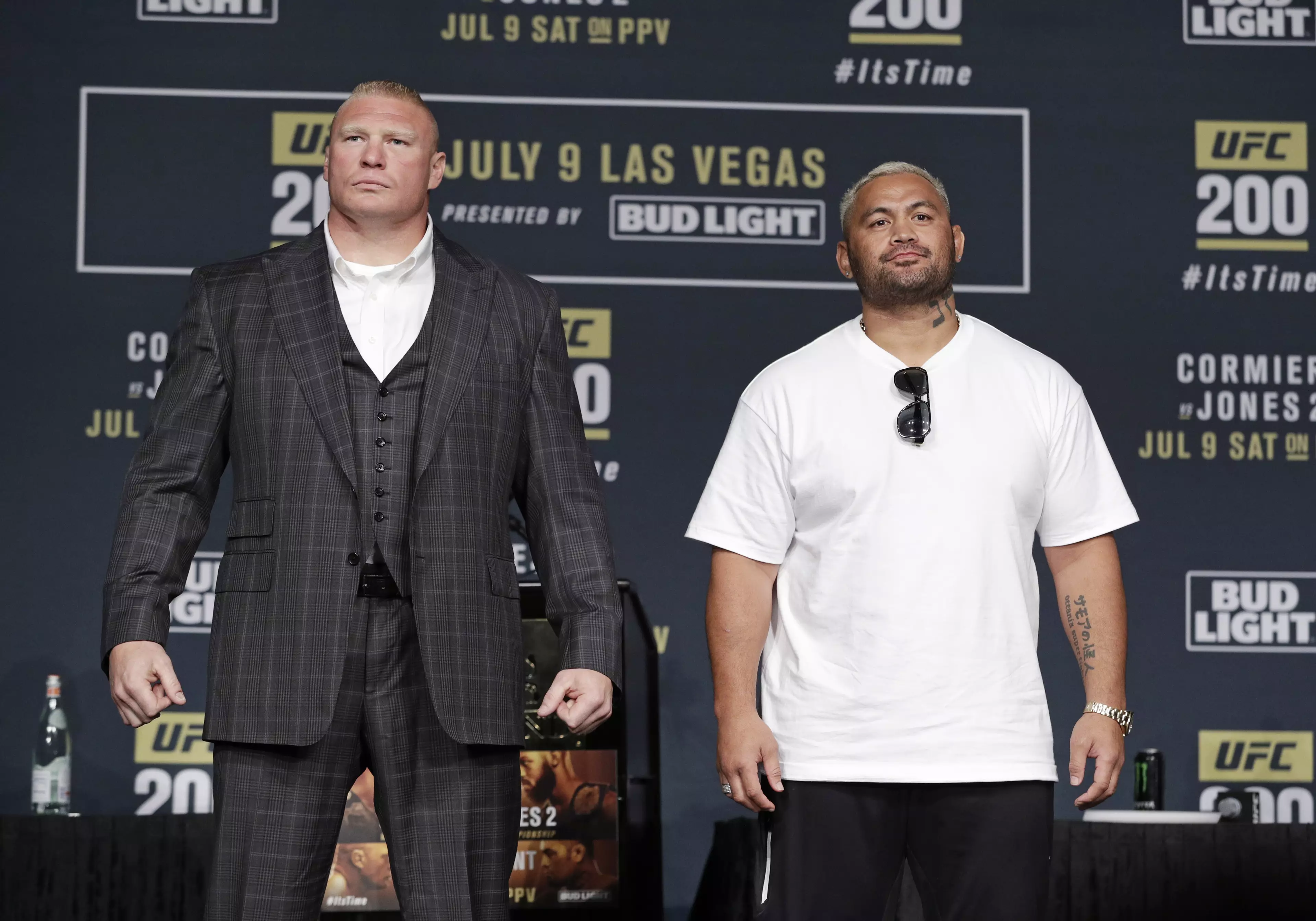
The lights of Seattle's Safeco Field shone down on Brock Lesnar, the 25-year-old in his rookie year on the WWE's main roster, main eventing his first ever WrestleMania. The 6'3, 285 pound frame of the number one contender for Kurt Angle's WWE Title had made a rare ascent to the top rope and was looking to give the 54,097 awestruck fans in attendance a WrestleMania moment they would never forget. And then the lights went out.
What came next was, undeniably, a WrestleMania moment, but for all the wrong reasons. WrestleMania 19 (or XIX if you prefer Roman numerals) had featured The Rock finally defeating Stone Cold Steve Austin at the third time of asking, Hulk Hogan overcoming Vince McMahon in an emotionally charged, bloodbath of a street fight and Shawn Michaels and Chris Jericho delivering an instant classic. But none of those matches will be remembered as vividly as all 285 pounds of Brock Lesnar landing square on his head and almost dying in front of over 50,000 people (around 1.50 into the below video).
'The Next Big Thing', as he was known during his initial run with the company, had attempted a shooting star press, a move usually reserved for performers a good 80 pounds lighter than Lesnar, but the super heavyweight soared through the air with the grace of a cruiserweight, until he realised he'd horrendously misjudged the distance between himself and his Olympic gold medalist opponent.
Advert
Lesnar's skull crushed into the canvas as a collective audible gasp was breathed in throughout Safeco Field. 'The Beast', with the help of Angle, made it to his feet to somehow complete the match and win his second WWE Title, but did so without having a clue where he was. Hall of Famer Ric Flair would later claim in an interview that the immense size and strength of Lesnar's neck and shoulders were all that kept him from being ushered backstage rather than carted off to the morgue.
That move (one which Lesnar had performed perfectly several times during his developmental days) botched or not, displayed Brock Lesnar as not just a world class athlete, but a world class freak of nature. It was immediately apparent to the WWE's audience that they were not merely witnessing a Hulk Hogan clone with '24 inch pythons', they were witnessing evolution in its most dramatic and terrifying form. This kid from South Dakota was built like a juggernaut but moved with the speed of a Lamborghini. It was as if his nefarious manager, Paul Heyman, had created him in a lab, splicing together Ivan Drago and the Terminator and channeling them into a farm boy from the Mid West.
There were those in the wrestling world, however, who knew of 'The Next Big Thing' before he traded in amateur wrestling for professional. His high school coach John Schilley once remarked that "He brought the level of heavyweight wrestling in the United States to a new level" and one look at Lesnar's high school and college record makes that statement nigh on impossible to argue with; He went 33-0 as a senior in high school, 56-3 at Bismarck Junior College and, after transferring, he went 50-2 at Minnesota. He finished his amateur career as a two-time NJCAA All-American, the 1998 NJCAA Heavyweight Champion, two-time NCAA All-American, two-time Big Ten Conference Champion, and the 2000 NCAA Heavyweight Champion. In four years of college, 'The Beast' lost just five bouts, winning 106. It's little wonder Minnesota Gophers fans wore 'BROCKFAST OF CHAMPIONS' t-shirts in his honour.
His amateur career could have been prolonged, of course. Qualification for the 2000 Olympics in Sydney was available to him, as was a spot on the University of Minnesota's football team, where coach Glen Mason wanted Lesnar to play defensive line. Football could wait another four years though, as there was a fortune to be made in suplexing poor pricks all over the squared circle.
Advert
A rookie entering the locker room of a professional wrestling promotion can usually expect a lengthy initiation akin to what new members of Wimbledon's 'Crazy Gang' endured in the '90s, only dialled up to 11 and fuelled by testosterone, jealousy, paranoia and politics. If you're Brock Lesnar, however, you just demand to be put on television after spending only 12 months in Ohio Valley Wrestling developmental and, when your wish is granted, promptly set about causing carnage on screen and off it.
'The Next Big Thing' had never been a wrestling fan growing up, so the reputations of Hulk Hogan, Stone Cold Steve Austin and The Undertaker meant little to him. Lesnar has always viewed wrestling as a job where he "punches in and punches out" and therefore, knowing that Vince McMahon was hell bent on propelling him to superstardom, Lesnar didn't give a single, solitary fuck who he pissed off.
Usually, such acts of insubordination would have led to Lesnar staring at the lights for a variety of opponents or even being sent on his merry way back to Webster, South Dakota. Instead, within four months of his main roster debut, Brock had beaten Hulk Hogan and then sent The Rock packing to Hollywood after claiming the WWE Title off him at SummerSlam 2002, becoming the company's youngest ever World Champion (his upcoming SummerSlam opponent, Randy Orton, would break that record two years later) only four months after his debut.
Aligned with Paul Heyman as his on screen agent, Lesnar had the ultimate mouthpiece and salesman by his side. New York native Heyman, widely considered one of the greatest wrestling managers of all time, is just as easy to hate as he is to love as a character and even in the present day, when it wouldn't appear necessary for an athlete as accomplished as Lesnar to require such promotion, Heyman still advocates 'The Beast' and has become as integral a part of his career as his German suplexes or the giant fucking sword that's tattooed across his torso.
Advert
However, even a genetic freak with the greatest manager in the world alongside him couldn't cope with the WWE's unenviable, gruelling schedule and two years later Lesnar traded sports entertainment for gridiron and signed with the NFL's Minnesota Vikings. However, Lesnar's abnormal agility, speed and work ethic weren't enough to land him a full time gig and he soon departed, although the attempted transition into American Football was far from a publicity stunt, with Lesnar receiving a glowing endorsement from Vikings defensive line coach Brian Baker , who said "I definitely was upset at first, but the thing about Brock is he flat-out earned my respect the past four weeks. I don't know how else to put it. You could pick 1,000 guys in his situation and not one of them would have lasted this long."
After a brief stint in Japan, which involved an IWGP Title victory and some legal wranglings over the WWE's overly restrictive six year no-compete clause that had been inserted into Lesnar's release in 2004, 'The Beast' entered the octagon.
"I can fight for real ... If it was legal and I wouldn't get in trouble, I'd pick a fight on every street. If I wouldn't lose any money or nothing, I would fight. I'd fight every day."
Lesnar's words weren't taken from a wrestling promo, they were his life's mantra. He loves to fight and he loves to hurt people. Just ask Frank Mir. The two time UFC Heavyweight Champion handed Lesnar his first UFC defeat in his first step inside the octagon at UFC 81, when he tapped him in the first round. But that's where Mir should have stopped. In the months that followed, Lesnar knocked Heath Herring into retirement and then dominated UFC legend Randy Couture to become the Heavyweight Champion. His first defence? A rematch with Mir, who had been relentless in his goading of Lesnar in the media.
Advert
Big...fucking...mistake.
At UFC 100, the company's biggest ever PPV audience of 1.6m people watched Lesnar punch Mir's face into oblivion. It was as brutal and unsettling as his post-match rant was entertaining. Lesnar bellowed "Who's the fuckin' man!?" at the end of the bout and when a microphone was put to his mouth, things got even more insane, "I'm gonna go home tonight, I'm going to drink a Coors Light, because Bud Light won't pay me nothing. I'm going to sit down with my friends and family and, hell, I might even get on top of my wife."

Just as Lesnar seemed to have the world of MMA at his feet, though, a bout of diverturculitis knocked 'The Beast' for six. The disease, which (apologies if you're eating while reading this) leaked fecal matter into Lesnar's bloodstream, could have taken Lesnar's life but, fortunately, ended up only seperating him from a foot long part of his colon during his second round of surgery, in 2011. However, despite overcoming the illness twice, there was no escaping its effects in the octagon, where Lesnar lost his last two fights, to Cain Velasquez and Alistair Overeem, convincingly in the first round.
Advert
Despite those back-to-back losses, Lesnar's legacy in the MMA world was cemented. He'd transitioned almost effortlessly into the sport, defeated some of UFC's biggest names, become a World champion in only his third fight and, following his title defences against Shane Carwin and Cain Velasquez became, at the time, only the second man in history to have two shows top one million buys in the same calendar year. The only other person to do so was Mike Tyson, who had three one million buy shows in 1996, in fights with Evander Holyfield, Frank Bruno and Bruce Seldon.
Even after re-signing with the WWE in 2012 and then again putting pen to paper on another contract that was as big as his neck and shoulders combined, in 2015, when he declared his UFC career officially dead, Lesnar couldn't stop scratching the itch. He won his fourth WWE Title at SummerSlam 2014, after tossing John Cena round the ring like a knackered Furby for 15 minutes. Months before, Lesnar made history when he ended The Undertaker's 21-0 WrestleMania undefeated streak. Even in the world of scripted professional wrestling, it was a result that became international news.
The accomplishment was bigger than any world title and, typically for Lesnar, it was another record broken, another accolade that no one else could attain. Yet it wasn't enough and so, not long after he dealt with Dean Ambrose at WrestleMania 32 in Dallas, this past April, Lesnar put a call into Dana White to see if the UFC President could make something happen.
And so here we are, at UFC 200, the company's biggest, and perhaps most turbulent, show to date. Lesnar's match with Mark Hunt was originally more likely to happen at UFC 202, with Conor McGregor's rematch with Nate Diaz originally headlining 200. However, when the Irishman pulled his 'retirement' stunt, those plans were knocked for a loop and in stepped 'The Beast' to take on 'The Samoan Superman', possibly the heaviest hitting man in the MMA world. He will step into the octagon as the underdog for perhaps the first time in his life and, following five years away from the sport, there's a good chance Hunt will punch 'The Beast' back into retirement, but for some reason, I can't imagine the thought of defeat is even entering Lesnar's mind right now.

After Hunt, eight sided rings will be traded for another return to four sides as Brock squares off against 12 time World Champion Randy Orton at SummerSlam on 21st August, in Brooklyn. Orton may regret bothering returning from his almost year long absence due to a shoulder injury as he'll either be facing a Lesnar smarting from a defeat or a Lesnar who's fresh from victory and hungry for more. Either way, neither option is likely to end well for 'The Viper' as, if Game Of Thrones has taught us anything, vipers should never attempt to take down Mountains.
WORDS BY @JoeBaia